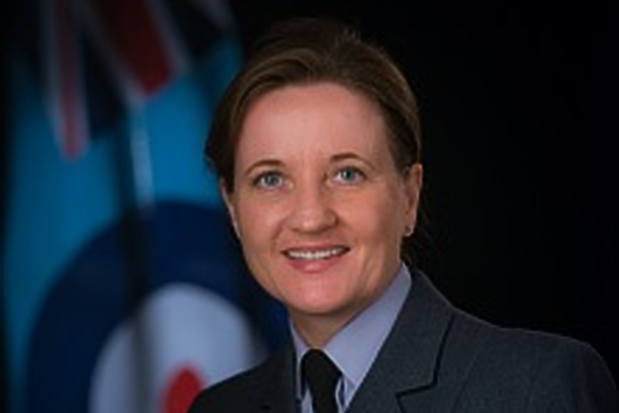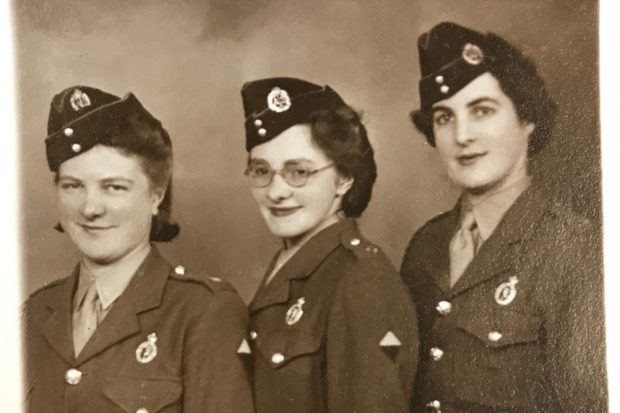
Profile
Job: Head of Accommodation
Organisation: Defence Infrastructure Organisation, Ministry of Defence
Years in Public Service: 27
My Great Aunt was...
My Great Aunt, Mary Gibson Martin, was born in 1913, the eldest of three children and the only girl. Following the premature death of her father, Mary was required to take responsibility for household jobs, shopping and helping to look after her younger brothers.
In 1928, aged 15, she left school where she was a bright pupil, to work for John Donald Drapers, a prestigious clothing shop in Dunfermline supplying all types of garments for adults. An early feminist, Mary was indignant that she had to clean and whiten her brothers' cricket boots and press their cricket 'whites'. “After all”, she would say, "they never did anything for me". She helped her Mother with household chores whereas the 'boys' did the garden - she reckoned they had the better deal!
All three were conscripted at the beginning of World War II; Mary joined the Women's Royal Army Corp and, after initial tests, it became evident that her strengths lay in Mathematics, English and cognitive speed. Training to become a wireless operator began.

After a year of training on the Isle of Man, she was based at a secret listening station in Harrogate intercepting enemy radio messages in Morse Code. Dispatch riders would rush the notes to Bletchley Park for decoding on the now famous Enigma Machine. Due to the secrecy at the time it was many years after the War that they understood how vital their work had been to the war effort.
After the War, Mary returned to her position at Donald's Drapers and before too long became Head Buyer, travelling to Glasgow and Edinburgh to buy clothing for the next season. She stayed single, living with and looking after her Mother financially; her Mother died in 1965.
The Townswomen's Guild was an important part of her life and she became President for many years. She also became President of the Federation of Business and Professional Women in her area between 1974-75. A good confident speaker she would give talks about her military service and never forgot the 'girls' she had served alongside. They met annually to holiday together into their nineties. Always a bookworm she believed that everyone should read and feed their mind.
![Newspaper cutting titled "Enigma girls meet up after 60 years" and includes a photo of the women. The text reads You’re looking at some old Enigma girls – ladies who’ve stayed firm friends since they trained as special wireless operators 60 years ago. Yet their recent diamond jubilee reunion in Ayr was only the second time they’d all been together since World War II. Based at a secret listening station in Harrogate, their job was to intercept enemy radio messages in Morse. Dispatch riders would then rush their notes to Bletchley Park for decoding on the now famous Enigma machine. It was, however, many years after the war before the girls learned of its existence. All the former “Y Operators” are not in their 80s or 90s, but their memories of training together in 1943 on the Isel of Man are as vivid as ever. “We could get things like egg and chips which you couldn’t get anywhere on the main land” recalled Ayr woman Etta Howie. They all still remember their Morse code too. At the end of the war Nan Clark (right) was first to be demobbed because she was getting married. “But first they put me on a cookery course so I could look after my husband properly!” she recalled. Nan, who organised the reunion, was the only one of the chums to marry. She now lives in East Kilbride and learned to use a computer last year to keep in touch with her grandchildren by e-mail. The others because career girls after leaving the ATS. Etta (second right) was an accountant at the Hannah Research Institute in Ayr. Retired teacher Betty Beighton (left), now living in Yorkshire, still gives talks on the “best kept secret of the war”. Pictured beside her (from left) are retired physiotherapist Pat Keats [text cuts off] pensioner Bessie Bell (Elgin) and Mary Martin, a former fashion [text cuts off]. Missing from the nostalgia w [text cuts off] Fairfield House Hotel was libra [text cuts off] Westhead, grounded in Stockport [text cuts off] recent fracture.](https://100years100women.blog.gov.uk/wp-content/uploads/sites/216/2018/05/Air-Cdre-Wendy-Rothery-3-e1548072818267-620x412.jpg)
Mary died in 2007 at the age of 94 having been independent and strong of mind and purpose until the end. She was as proud of me as I am of her and we very much enjoyed comparing notes on our military service. She would be delighted with the opportunities now available to women and the extraordinary progress that has been achieved over the last century.
Me in a paragraph
I consider myself very fortunate to have served with the Royal Air Force (RAF) in a variety of challenging command and staff roles and interesting locations across the globe, including on operations in the Gulf and Afghanistan.
Although an HR specialist, I have broadened my skillset to include career management, media operations and outer office support.
My last appointment as Head of RAF Recruitment and Selection coincided with the opening of the ground close combat role to women; all RAF career opportunities are now open to everyone regardless of gender, ethnicity and sexual orientation. With females now serving at the very top of the organisation, at Air Force Board level, and the RAF Centenary celebrations coinciding with the centenary of women’s suffrage, there has never been a better time to promote the opportunities available to women in the RAF – the sky really is the limit.
My role
I am currently responsible for a team of more than 200 staff who ensure the provision of Service Families Accommodation in the UK and Europe to Decent Homes standard.
Quality accommodation and customer service is one of the highest priorities for Service personnel and their families and is a key enabler of operational capability. If servicemen and women know that their families are well supported, they can focus on the often difficult tasks they face when deployed on operations, exercises or other duties away from home. Consequently, my team’s work in support of this endeavour is fundamental to Defence’s ability to achieve its outputs.
If I had a magic wand, what I would do to accelerate gender equality?
I would implement a programme in primary schools to remove the gender bias that still seems to exist and illustrate the career and lifestyle opportunities available to everyone regardless of gender.
Anything else you would like to say
Gender equality is not just good for women, it is good for business and it is good for society.
Subscribe to this blog for more stories from inspirational women. You can also follow Suffrage Centenary on Twitter.
2 comments
Comment by Alexandra Martin posted on
So proud to be a martin with my family history and to my neice Wendy rothery for keeping the RAF tradition
Comment by Trudie Scholes posted on
I joined up in 1977 and left in 1996. In my first role I had to make teas and coffees for the whole office because I was a woman! In 1991 I became the first WRAF to remain in Service during pregnancy and returned to work when my son was 5 weeks old - because there was no maternity pay initially. I fought misogynist behaviour and discrimination throughout my career and was always aware that I have to be twice as good as the men to get anywhere. I am so pleased that things have improved and am thrilled to see the RAF promoting women at the top levels. I still work for MoD (DIO) as a B2 Accountant but am nearing retirement now.